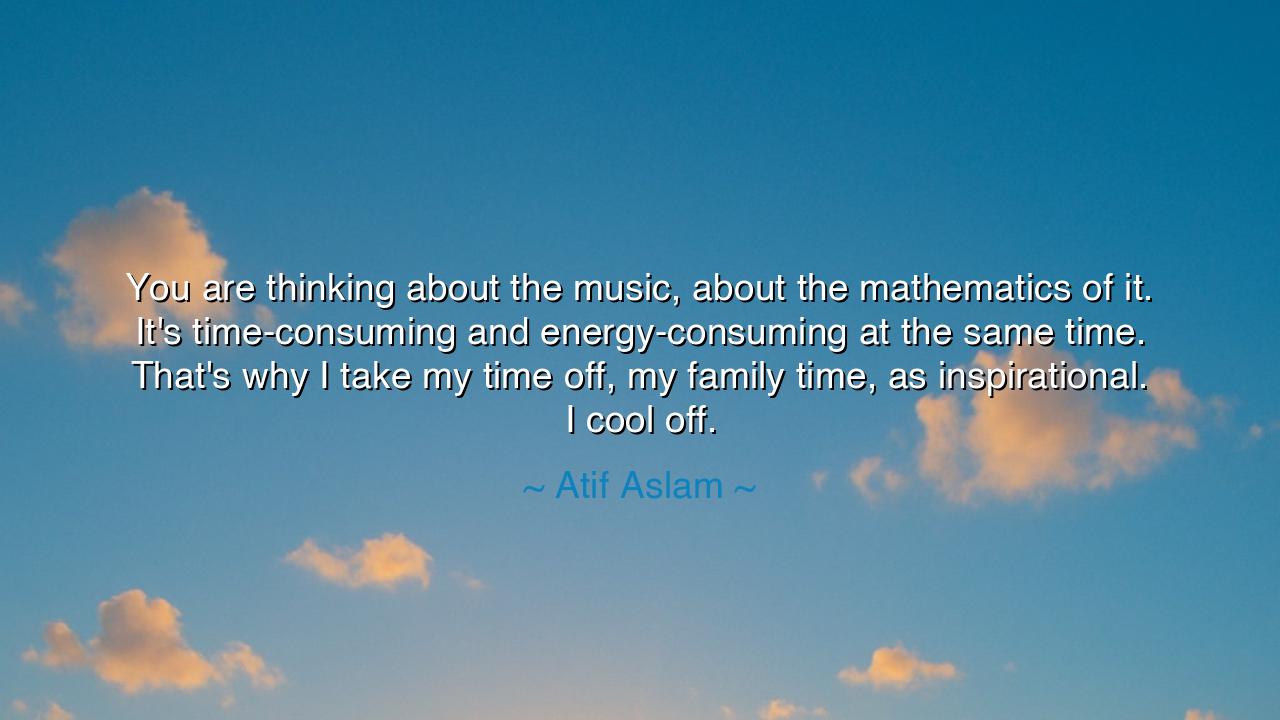
You are thinking about the music, about the mathematics of it.
You are thinking about the music, about the mathematics of it. It's time-consuming and energy-consuming at the same time. That's why I take my time off, my family time, as inspirational. I cool off.






In the thoughtful words of Atif Aslam, there lies a reflection both humble and profound: “You are thinking about the music, about the mathematics of it. It's time-consuming and energy-consuming at the same time. That's why I take my time off, my family time, as inspirational. I cool off.” These words carry the wisdom of balance — a truth as ancient as creation itself. For even the most gifted must pause; even the most passionate must rest. Atif, a master of melody, speaks not of indolence but of renewal — the sacred rhythm between discipline and restoration, between the precision of art and the peace of the soul.
When he speaks of “the mathematics of music,” he touches on one of art’s oldest paradoxes. Music is not mere feeling — it is architecture in sound. Every note, every measure, every breath follows a hidden order, a geometry of rhythm and tone. The ancients called it the Harmony of the Spheres, believing that the universe itself moved to musical proportion. Pythagoras, the philosopher and mathematician, discovered that strings of certain lengths produced perfect intervals — that beauty, even in song, was born from number and reason. So too does Atif remind us that true artistry requires not only passion, but patience; not only inspiration, but structure.
Yet, as he confesses, such devotion comes at a cost. To labor in the craft is to pour out energy, to give oneself wholly to the muse. “It’s time-consuming and energy-consuming,” he says — a line that reveals the quiet exhaustion that shadows all creators. The ancient sculptor who chipped marble until his hands bled, the poet who wrestled with words through sleepless nights — all knew that mastery demands sacrifice. But Atif, with the humility of a sage, teaches a deeper truth: that the soul cannot sing if it is never silent, that the fire of inspiration burns brightest after rest.
When he turns to “family time” for renewal, he mirrors the wisdom of the elders who understood that love and peace are the wellsprings of art. The Roman philosopher Seneca wrote that no great work could arise from a restless heart. Similarly, the Chinese poet Li Bai, after wandering mountains in solitude, returned to his friends and wine, finding in their laughter the spark for his greatest verses. In this way, Atif’s “cooling off” is not escape — it is return. By grounding himself in family and stillness, he draws new breath for his music. Inspiration, after all, is not found only in the stage lights, but in the quiet presence of those we love.
There is heroism, too, in his gentleness. To take rest is an act of wisdom, not weakness. The warrior lays down his sword not in defeat, but in reverence for life beyond battle. The artist, too, must lay down his instrument at times, to remember why he plays. Atif’s words call us back to this sacred cycle: creation, exhaustion, renewal, and rebirth. Just as winter prepares the earth for spring, rest prepares the artist for another song.
His insight extends beyond music. Every craft, every calling — be it teaching, building, leading, or dreaming — demands this same rhythm. To think deeply, to labor well, to give your best — these are noble. But to pause, to breathe, to reconnect with what makes life worth living — that is divine. Those who never “cool off” soon lose the melody of their purpose.
Thus, the lesson of Atif Aslam’s words is clear: guard your balance as you guard your passion. Work with all your heart, but rest with equal devotion. Let your family, your friends, your silence, become your sanctuary. For from these springs flows the energy of all creation. The artist who knows when to sing and when to listen, when to work and when to rest, walks the true path of mastery.
So, take this teaching as your own: when your mind grows weary with the mathematics of your labor, step away and find music in the ordinary — in laughter, in love, in the still air of evening. Cool off, as Atif says. For in that cooling lies the warmth of inspiration reborn.






AAdministratorAdministrator
Welcome, honored guests. Please leave a comment, we will respond soon